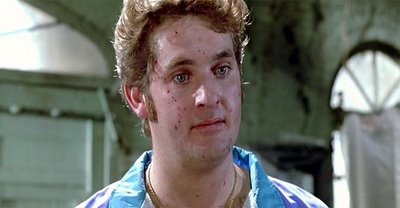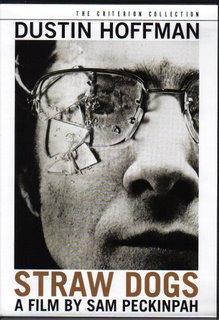Although I will leave this blog up for the time being, I can be reached at my brand new spankin' blog:
http://derekhill.wordpress.com/
It's like getting a new haircut or getting new sneakers! And if you like football (soccer), me and the apm gang can still be read over at:
http://aprettymove.blogspot.com/
Salut!
D
Friday, March 28, 2008
Sunday, April 23, 2006
New Blog
It was bound to happen. Along with my partner in crime, Lynda, and my dear friend Lisa, the three of us have eagerly--and perhaps foolishly--entered the world of blogging about one of our favorite pastimes . . . soccer. If any one out there is interested in reading our thoughts, ruminations, and just plain irreverent comments about the beautiful game, then head on over to:
http://aprettymove.blogspot.com/
Nightmare Town is certainly not going away--in fact I plan on getting back to it within the next few days or so--but I simply found that I needed some kind of outlet for all of the time I spend thinking and dreaming about life on the pitch.
http://aprettymove.blogspot.com/
Nightmare Town is certainly not going away--in fact I plan on getting back to it within the next few days or so--but I simply found that I needed some kind of outlet for all of the time I spend thinking and dreaming about life on the pitch.
Friday, March 03, 2006
Goodbye Wellspring
 And speaking of Harvey Weinstein and his brother, the infernal duo have bought up New York's cherished Wellspring Media, theatrical distributors for Tsai Ming-liang's enigmatic and luminous Goodbye, Dragon Inn, among other art house films that would probably not have seen any theatrical distribution if not for the floundering company.
And speaking of Harvey Weinstein and his brother, the infernal duo have bought up New York's cherished Wellspring Media, theatrical distributors for Tsai Ming-liang's enigmatic and luminous Goodbye, Dragon Inn, among other art house films that would probably not have seen any theatrical distribution if not for the floundering company.Bastards.
Read more about it here.
Lost in America
 Here’s an interesting article about the dearth of wide theatrical distribution for foreign films here in the States and how our tastes have changed in contrast to the heyday of the 1960s thru the 1970s, when films from overseas didn’t just play in arthouse theaters or on college campuses. And it wasn’t just the foreign film behemoths—like Bergman, Kurosawa, Truffaut, Fellini, and Bunuel among others—which were being shown. Foreign genre fare, e.g. Spaghetti Westerns, Italian gothic horror and sword & sandal epics, Japanese kaiju eiga, and Hong Kong martial arts pictures were routinely flooding the market place—albeit in dubbed form—playing grindhouses and drive-in theaters all over. And they were also playing on television, which is how I first discovered them.
Here’s an interesting article about the dearth of wide theatrical distribution for foreign films here in the States and how our tastes have changed in contrast to the heyday of the 1960s thru the 1970s, when films from overseas didn’t just play in arthouse theaters or on college campuses. And it wasn’t just the foreign film behemoths—like Bergman, Kurosawa, Truffaut, Fellini, and Bunuel among others—which were being shown. Foreign genre fare, e.g. Spaghetti Westerns, Italian gothic horror and sword & sandal epics, Japanese kaiju eiga, and Hong Kong martial arts pictures were routinely flooding the market place—albeit in dubbed form—playing grindhouses and drive-in theaters all over. And they were also playing on television, which is how I first discovered them.Yeah, times have changed and foreign films aren’t getting the theatrical distribution they once did. But there aren’t as many theaters around nowadays either. When I first read this article I got all indignant and sentimental. But it occurred to me that DVD has really helped in exposing individuals to the wild world of foreign films arguably more than ever before, especially if you own a multi-region player. Granted, most people simply don’t give a shit about quality domestic films let alone foreign ones, though occasionally the masses do seem to get out into the theaters to watch a subtitled picture, hence the successes of Crouching Tiger, Hidden Dragon, Hero, and Kung Fu Hustle, all of which played wide and thankfully weren’t dubbed. And in regards to the Academy’s foreign film nominations this year . . . don’t get me started. Yeah, where was Cache, 2046 (probably my favorite film of the year), and Johnnie To’s Election?
The funniest and strangest part of the article, though, is reading Harvey Weinstein talk about how much he loves foreign films, blah, blah, blah. This is the man, remember, who bought up then shelved or edited a host of films when he ran Miramax. And it looks like his addiction to snipping down other people’s products hasn’t stopped, if his acquisition (though the Weinstein Co. has subsequently dropped the film) and cutting down of Chen Kaige’s The Promise from 122 minutes to 102 minutes is any indication. Luckily, if you’d rather watch the original version before the truncated version (courtesy of Warner Independent Pictures) plays theaters in May, you can simply watch the DVD.
Without further ado, here’s the Newsweek article:
http://www.msnbc.msn.com/id/11432913/site/newsweek/
Sunday, February 26, 2006
Octavia Butler 1947-2006
Science-fiction writer Octavia Butler died Friday. She was only 58 years old. Like everyone else, I'm floored by the news. She was an amazing and gifted writer who managed to balance complex themes with engaging characters who were forced to navigate through sometimes dark and troubling circumstances. But Butler's work was always grounded in humanity and hope despite her sometimes pessimistic outlook.
Tragic news indeed. We've lost one of the greats.
For more info, check out the following links:
http://seattletimes.nwsource.com/html/localnews/2002831388_butlerobit27m.html
http://seattlepi.nwsource.com/books/260959_butlerobit26ww.html
http://darkush.blogspot.com/2006/02/octavia-butler-died-saturday.html
http://www.sfwa.org/news/2006/obutler.htm
http://lyndaerucker.blogspot.com/
Tragic news indeed. We've lost one of the greats.
For more info, check out the following links:
http://seattletimes.nwsource.com/html/localnews/2002831388_butlerobit27m.html
http://seattlepi.nwsource.com/books/260959_butlerobit26ww.html
http://darkush.blogspot.com/2006/02/octavia-butler-died-saturday.html
http://www.sfwa.org/news/2006/obutler.htm
http://lyndaerucker.blogspot.com/
Wednesday, February 15, 2006
Big Atonement: Sympathy for Lady Vengeance (2005)
 The 29th Portland International Film Festival is in full-swing, and though I haven’t actually ventured out to see any of the films on the big screen yet (that $9 ticket price is just too rich for my wallet at the moment), I did manage to track down an import DVD of Park Chan-wook’s latest film, Sympathy for Lady Vengeance (or Lady Vengeance as it has sadly been rechristened here in the States), the third film in Park’s loose “Vengeance Trilogy” and the follow-up to 2003’s magnificent and unforgettable hardboiled thriller Oldboy. For those of you who have seen Oldboy (and if you haven’t and still call yourself a film lover, you better hand in your resignation) or Sympathy for Mr. Vengeance from 2002, you know what cinematic brilliance Park is capable of. The Korean director is a sly and ruthless provocateur who manages to balance a brazen visual sense with compelling melodramatic (sometimes) storylines and tortured guilt-plagued characters. And, oh yes, then there’s the violence. There’s no getting around the fact that Park’s trilogy of vengeance-fuelled films are frequently savage and shocking in their willingness to plunge us into the crimson-induced obsessions of his protagonists. But his films are also exhilarating, ironic, surreal (who can forget the ant seated on the subway in Oldboy?), and humorous.
The 29th Portland International Film Festival is in full-swing, and though I haven’t actually ventured out to see any of the films on the big screen yet (that $9 ticket price is just too rich for my wallet at the moment), I did manage to track down an import DVD of Park Chan-wook’s latest film, Sympathy for Lady Vengeance (or Lady Vengeance as it has sadly been rechristened here in the States), the third film in Park’s loose “Vengeance Trilogy” and the follow-up to 2003’s magnificent and unforgettable hardboiled thriller Oldboy. For those of you who have seen Oldboy (and if you haven’t and still call yourself a film lover, you better hand in your resignation) or Sympathy for Mr. Vengeance from 2002, you know what cinematic brilliance Park is capable of. The Korean director is a sly and ruthless provocateur who manages to balance a brazen visual sense with compelling melodramatic (sometimes) storylines and tortured guilt-plagued characters. And, oh yes, then there’s the violence. There’s no getting around the fact that Park’s trilogy of vengeance-fuelled films are frequently savage and shocking in their willingness to plunge us into the crimson-induced obsessions of his protagonists. But his films are also exhilarating, ironic, surreal (who can forget the ant seated on the subway in Oldboy?), and humorous.Lynda and I saw Oldboy at last year’s PIFF and were stunned by the film. I quickly sought out Mr. Vengeance, Joint Security Area, and his contribution to the Asian horror anthology film Three… Extremes, entitled Cut, and easily became a committed fan of his work. Here was a director to be reckoned with, though I was a bit perplexed as to where he would venture creatively next, especially when I heard that he was going to follow-up Oldboy with another revenge storyline. Shouldn’t he take a break from all that mayhem, I thought, before completing the trilogy? Maybe venture out and make an outright comedy or return to the political thriller mode that he no doubt can pull off, like in J.S.A. And even if he did make the final film in the trilogy at this point in his career, there was no way that Park was going to be able to match the creative peak of Oldboy. Right?
Wrong. I’m not going to say much about the plot of Lady Vengeance because knowing little or nothing about the film is the only way to go into it, the only way to fully experience the seductive power of its intent and to ride the emotional tidal waves that overpower during the film’s second half. Technically, the entire film is an unmitigated tour de force—elegantly composed yet willing to circumvent viewer’s expectations by changing the dramatic beats of the traditional i.e. basic revenge storyline whenever we grow too comfortable or acclimated to what is transpiring on screen. No doubt, Park loves to jazz about. But if there was nothing substantial to anchor the excess of style, I would have little patience with him and I don’t think that Lady Vengeance would be able to weather the repeatability factor (I watched it twice in 24 hours). Actress Lee Yeong-ae gives one of the finest performances of the year as the stunningly attractive Lee Geum-ja, the titular Lady V. who is bent on some serious payback once she’s released from prison after 13 years, and the fabulous Choi Min-sik (Oh Dae-su from Oldboy) as Mr. Baek easily grounds the film when Park’s visual flourishes are in full flight (which is most of the time). But there’s genuine emotion amidst all of the sensational mayhem, and Park’s solemn resolution after so much brutality is what last longest in my mind.
Lady Vengeance is harrowing stuff and much of its content is intentionally inflammatory and shocking. And though it’s difficult to defend the film without giving away some of its more startling moments, there is a method to it all and ultimately a responsible and moral exploration of how violence corrupts the soul. It’s also fiendishly entertaining and the best damn feel-bad film around.
(Sympathy for) Lady Vengeance plays at the PIFF on 2/17/06 and 2/18/06. It’s also available on import DVD here.
Wednesday, January 25, 2006
Nice Guy Eddie R.I.P.
 Actor Chris Penn, the younger brother of fellow thespian Sean and musician Michael, was found dead yesterday due to unknown causes. Like his famous brother, Chris began working in films early and co-starred in Francis Coppola's Rumble Fish, All the Right Moves (along with Tom Cruise), Footloose, Clint Eastwood's Pale Rider, and Robert Altman's Short Cuts, among many others. Some of my favorite Chris Penn roles were from The Wild Life (scripted by Cameron Crowe as a follow-up to Fast Times at Ridgemont High), Made in USA (a rarely seen "road trip" film with Lori Singer and Adrian Pasdar), At Close Range (an excellent crime film by James Foley and starring Sean Penn and Christopher Walken), True Romance, and of course, Reservoir Dogs, in which Penn played the foul-mouthed and very loyal Nice Guy Eddie.
Actor Chris Penn, the younger brother of fellow thespian Sean and musician Michael, was found dead yesterday due to unknown causes. Like his famous brother, Chris began working in films early and co-starred in Francis Coppola's Rumble Fish, All the Right Moves (along with Tom Cruise), Footloose, Clint Eastwood's Pale Rider, and Robert Altman's Short Cuts, among many others. Some of my favorite Chris Penn roles were from The Wild Life (scripted by Cameron Crowe as a follow-up to Fast Times at Ridgemont High), Made in USA (a rarely seen "road trip" film with Lori Singer and Adrian Pasdar), At Close Range (an excellent crime film by James Foley and starring Sean Penn and Christopher Walken), True Romance, and of course, Reservoir Dogs, in which Penn played the foul-mouthed and very loyal Nice Guy Eddie.He'll be missed. You can read more about the criminally overlooked character actor here.
Monday, January 23, 2006
Then Why'd You Hire Him in the First Place?
The notorious and ubiquitous Japanese director Takashi Miike’s entry for the Showtime anthology series, Masters of Horror, has been yanked from the schedule and will instead be released on DVD uncut. The prolific filmmaker, who has a penchant for disturbing, bizarre, and outright violent subject matter (Audition, MPD Psycho, Visitor Q, Ichi the Killer, among loads of others)—though his latest feature-film is a kid’s movie based on the splendid Yokai Monsters fantasy-horror series from the 1960s—has been given the boot because . . . his entry was disturbing, bizarre, and violent. Go figure. Creator and executive producer Mick Garris (he’s also the director of the execrable Sleepwalkers, and the television mini-series The Stand and The Shining) was quoted in The New York Times as saying Miike’s film for Showtime, entitled Imprint, was “definitely the most disturbing film” he’d ever seen. Well, I should hope so. I’m not the biggest Miike admirer around (though I . . . eh, loved Audition and I enjoyed his entry for the Three Extremes anthology film) but the man definitely knows how to craft grueling, transgressive horror films. What did the folks over at Showtime think they were going to get?
You can read more about the whole ordeal here.
You can read more about the whole ordeal here.
Tuesday, January 17, 2006
I Don't Know My Way Home: Straw Dogs (1971)
 In the wake of the recently released Sam Peckinpah DVD boxed set, I’ve been prepping myself by watching some of his earlier released discs before I plunge headfirst into the goldmine. That’s not to say that some of Peckinpah’s masterpieces haven’t already been unleashed upon the public. Far from it. The infamous director arguably has a stable full of classic films in his short if uneven oeuvre, including this staggeringly brutal meditation on violence starring Dustin Hoffman. Straw Dogs, based on a novel by Gordon Williams entitled The Siege of Trencher’s Farm, was notorious when it originally hit theater screens in 1971 (the same year that Eastwood appeared as the titular Dirty Harry and Kubrick’s A Clockwork Orange pillaged patrons with its dystopian SF parable) and its unbridled power and relentless capacity to provoke and outrage viewers hasn’t abated one bit. I’ve seen it a few times before and its lucid yet bewildering treatise on the violence that swims within even the most “civilized” of individuals still continues to fascinate as well as sicken and horrify me. Although Peckinpah had previously dealt with the theme of man’s predilection toward committing carnage, and the almost ritualistic need to do so, most notably in his sure-fire masterpiece The Wild Bunch (newly re-released with the boxed set), Straw Dogs is probably the most brilliant and methodical examination of what motivates a person to kill that the director ever created. The film’s main question is simple: What will it take for a “civilized” person to destroy another person? But it’s the can of worms that ensues that is even more troubling. In killing someone, what do you surrender within yourself? And is violence the natural state of man? The answers to those conundrums are not proffered in the course of the film’s running time, though if they had been, I’m not so sure we would be too pleased. It’s potent stuff, to say the least, but also greatly entertaining.
In the wake of the recently released Sam Peckinpah DVD boxed set, I’ve been prepping myself by watching some of his earlier released discs before I plunge headfirst into the goldmine. That’s not to say that some of Peckinpah’s masterpieces haven’t already been unleashed upon the public. Far from it. The infamous director arguably has a stable full of classic films in his short if uneven oeuvre, including this staggeringly brutal meditation on violence starring Dustin Hoffman. Straw Dogs, based on a novel by Gordon Williams entitled The Siege of Trencher’s Farm, was notorious when it originally hit theater screens in 1971 (the same year that Eastwood appeared as the titular Dirty Harry and Kubrick’s A Clockwork Orange pillaged patrons with its dystopian SF parable) and its unbridled power and relentless capacity to provoke and outrage viewers hasn’t abated one bit. I’ve seen it a few times before and its lucid yet bewildering treatise on the violence that swims within even the most “civilized” of individuals still continues to fascinate as well as sicken and horrify me. Although Peckinpah had previously dealt with the theme of man’s predilection toward committing carnage, and the almost ritualistic need to do so, most notably in his sure-fire masterpiece The Wild Bunch (newly re-released with the boxed set), Straw Dogs is probably the most brilliant and methodical examination of what motivates a person to kill that the director ever created. The film’s main question is simple: What will it take for a “civilized” person to destroy another person? But it’s the can of worms that ensues that is even more troubling. In killing someone, what do you surrender within yourself? And is violence the natural state of man? The answers to those conundrums are not proffered in the course of the film’s running time, though if they had been, I’m not so sure we would be too pleased. It’s potent stuff, to say the least, but also greatly entertaining.Set in the west coast of England, in a quant if dismal little village in Cornwall, American mathematician David Sumner (Hoffman) and his wife Amy (Susan George), who is originally from the village, move into her late father’s ancestral stone cottage with dreams of starting a new life away from the crime and pollution of the States. Of course, this being a Peckinpah film, David’s and Amy’s attempt at domestic bliss is shattered by a horrendous incident and David is forced into finally making a stand against his provokers, as well as coming to grips with the darkness within. The screenplay by David Zelag Goodman and Peckinpah deftly thwarts our expectations at every turn by constantly twisting or changing the plot points leading to the inevitable. The road to perdition may be unavoidable for David, but there’s no clear journey there and the catalysts that we were so positive would ensnare him or push him over the brink wind up being meaningless in the big picture.
Peckinpah’s films (at least the important ones) are like cinematic Rorschach blots, never quite revealing the same thing to everyone. To some, the director is a macho provocateur wallowing in misogynistic representations of women and celebrating the most vile, ugly, and brutish characteristics in men. To others, he’s the last great American director in the tradition of Hawks and Ford before the film school brats (e.g. Coppola, De Palma, Lucas, Scorsese, and Spielberg) usurped the throne of 1970s Hollywood, a maverick larger-than-life personality who challenged the celluloid dream factory and lost. I guess I’m somewhere in the middle of the two camps. There’s no doubt in my mind that Peckinpah’s best films (Ride the High Country, Major Dundee, The Wild Bunch, Straw Dogs, Pat Garrett and Billy the Kid, Bring Me the Head of Alfredo Garcia) are the work of a mature and gifted artist, though many of them (Straw Dogs, Bring Me the Head of Alfredo Garcia most notably) also betray a profound misanthropy that borders on the morbid and nihilistic. The characters in the latter two films both transform into their new roles as men of violence so thoroughly that it borders on the psychopathic, though Warren Oates’ Bennie, from Bring Me the Head, at least hasn’t forsaken redemption altogether. He at least still covets the idea of redemption, even though his instincts know better. When David Sumner crosses over in Straw Dogs, there’s not even the slightest glimmer of reason left in him. He fully accepts his new role as killer angel, and as the protector of his bloodied homestead without a trace of self-knowledge or insight. He’s pure animal instinct at that point, and the transformation/rampage against the attackers is horrifyingly funny because of his lack of self-control. There’s also nothing more disturbing than witnessing someone lost within the thickets of his own personal moral oblivion.
Every time I return to the film, I’m reminded just how coherent and troubling its “message” is. I’m also stunned by how thorough Peckinpah’s lust to hurt us truly is. Obviously, he wants to shock us with the overt build-up of tension and the orgasmic violence that eventually overcomes us. But he more importantly wants to incite a riot of thought inside us, as well. Forget David Sumner. What would you do in the same situation? And would you like it?
Straw Dogs has been released onto DVD a few times here in the States, though never better than in the 2-disc Criterion Collection edition (which is now sadly out of print). The print is superb—the best I’ve ever seen it—and the wealth of extras (including two excellent essays, a feature-length documentary on Peckinpah, and some candid interviews with actress Susan George and producer Daniel Melnick) really help to clarify some of the film’s trickier and more unsettling motivations. Though really, I’m not sure any justification or explanation can tame this dark beast of a film, even thirty-some-years on.
Thursday, January 05, 2006
A Fistful of Sushi or: Confessions of a Fellow Asian Film Freak
Jonathan Ross is a British radio/television host and confirmed lover of the strange, wild, weird, and bizarre as it relates to film. Back in the late-1980s he hosted a pretty good Cult Film 101 documentary called The Incredibly Strange Film Show which aired on A & E (I think) here in the U.S. Well, Ross is hosting a new show entitled Jonathan Ross's Asian Invasion next week on BBC4. Unfortunately, I don't live in Britain and I only get BBC America on the ol' digital cable, which I'd wager wont be airing this anytime soon if at all. I love Asian film in all its various and complex permutations, so I got a kick out of this article from the Guardian Unlimited, giving us all a little taste of what Mr Ross will offer up:
http://film.guardian.co.uk/features/featurepages/0,4120,1680108,00.html
http://film.guardian.co.uk/features/featurepages/0,4120,1680108,00.html
Subscribe to:
Comments (Atom)
